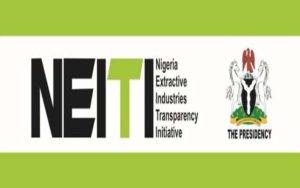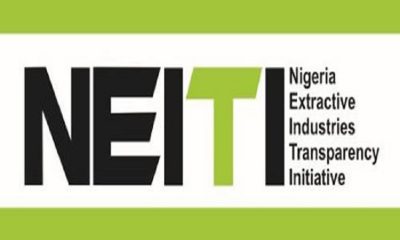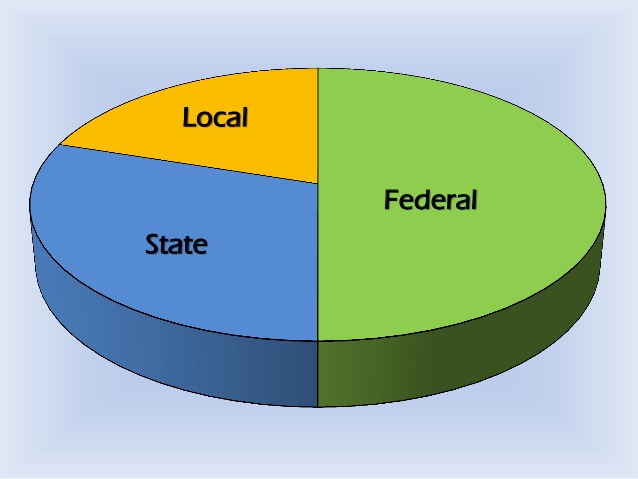Economy
NEITI Fumes Over N1.1tn Tax Waivers to Oil Firms


By Dipo Olowookere
The Nigerian Extractive Industries Transparency Initiative (NEITI) has kicked against the tax holiday given to 22 oil companies by the Federal Government.
The FG had given the sector a Pioneer Status of N1.1 trillion.
According to a latest report from NEITI, it described the waiver as a loss of revenue to the FG, pointing out that this would hamper development projects in the economy.
A copy of the report obtained by The Guardian stated that granting pioneer status to oil and gas companies has greatly undermined the optimal collection of revenue due from Petroleum Profit Tax (PPT).
NEITI advised that pioneer status should not be granted to any company in the oil and gas sector, unless it is evidently clear that the company is actually pioneering an aspect of the industry in the country.
It therefore, called for a “Regular review of the pioneer status to discover some of the companies granted tax waivers that had outgrown pioneer status.
“A coordinating desk should be established in the Ministry of Finance for all the agencies that process tax incentives while the final approval for tax waivers should be issued by the Minister of Finance.”
Pioneer Status is a tax holiday incentive, designed by the government and backed by the law granted to targeted industries, products and services, designated as priority areas and growth drivers of the economy.
But speaking recently on the benefits of pioneer status, Seplat Petroleum Development Company Plc’s Chief Executive, Mr Austin Avuru, noted that the grant of pioneer status made it possible for the company to boost oil and gas production, provide employment opportunities, impact on their communities and help grow the Nigerian economy.
At the presentation of report by the Tax Justice and Governance Platform, tagged: “Pioneer Status in Oil and Gas Industry; Is It Worth It?,” discussants argued that the pioneer status given to oil and gas companies was not worth it, noting that as long as these companies are making profit, they will be adding little or nothing to the development of the nation.
The group urged the National Assembly to monitor the action of government agencies in granting tax incentive.
“The FIRS should ensure that PS beneficiaries file tax returns annually with sanction imposed on defaulters. NIPC capacity in monitoring pioneer companies should be strengthened, while removing matured companies from the pioneer status list. Government should sign a Memorandum of Understanding (MOU) with marginal field operators on the establishment of guaranteed margins for the companies.”
Explaining the benefits of pioneer status to companies, the Nigerian Investment Promotion Council (NIPC) said in a document on “Investing in Nigeria,” that the grant of Pioneer Status to an industry is aimed at enabling the industry concerned to make a reasonable level of profit within its formative years.
It noted that the profit so made is expected to be ploughed back into the business.
The agency stated: “Pioneer status is a tax holiday granted to qualified or (eligible) industries anywhere in the Federation and five-year tax holiday in respect of industries located in economically disadvantaged local government area of the Federation. At the moment, there is a list of 71 approved industries declared pioneer industries, which can benefit from tax holiday.
“To qualify, a joint venture company or a wholly foreign-owned company must have a minimum share capital of N10 million and incurred a capital expenditure of not less than N5million, whilst that of qualified indigenous company should not be less than N150,000.00. In addition, an application in respect of Pioneer Status must be submitted within one year the applicant’s company starts commercial production otherwise the application will be time-barred.”
The Guardian
Economy
NGX RegCo Cautions Investors on Recent Price Movements

By Aduragbemi Omiyale
The investing public has been advised to exercise due diligence before trading stocks on the Nigerian Exchange (NGX) Limited.
This caution was given by the NGX Regulation Limited (NGX RegCo), the independent regulatory arm of the NGX Group Plc.
The advisory became necessary in response to notable price movements observed in the shares of certain listed companies over recent trading sessions.
On Monday, the bourse suspended trading in the shares of newly-listed Zichis Agro-allied Industries Plc. The company’s stocks gained almost 900 per cent within a month of its listing on Customs Street.
In a statement today, NGX RegCo urged investors to avoid speculative trading based on unverified information and to consult licensed intermediaries such as stockbrokers or investment advisers when needed.
It explained that its advisory is part of its standard market surveillance functions, as it serves as a measured reminder for investors to prioritise informed and disciplined decision-making.
The notice emphasised that the Exchange will continue to monitor market activities closely in line with its mandate to ensure a fair, orderly, and transparent market.
“NGX RegCo encourages all investors to base their decisions on publicly available information, including a thorough assessment of company fundamentals, financial performance, and risk profile,” a part of the disclosure said.
It reassured all stakeholders that the NGX remains stable, well-regulated, and resilient, saying the platform continues to foster an environment where investors can participate with confidence, supported by robust oversight and transparent market operations.
“Our primary responsibility is to maintain a level playing field where market participants can trade with confidence, backed by timely and accurate information.
“This advisory is a routine communication, reinforcing that sound fundamentals, not speculation, remain the foundation for sustainable investment outcomes. We are fully committed to preserving the integrity and stability of our market,” the chief executive of NGX RegCo, Mr Olufemi Shobanjo, stated.
Economy
Stronger Taxpayer Confidence, Others Should Determine Tax Reform Success—Tegbe

By Modupe Gbadeyanka
The chairman of the National Tax Policy Implementation Committee (NTPIC), Mr Joseph Tegbe, has tasked the Nigeria Revenue Service (NRS) to measure the success of the new tax laws by higher voluntary compliance rates, lower administrative costs, fewer disputes, faster resolution cycles, and stronger taxpayer confidence.
Speaking at the 2026 Leadership Retreat of the agency, Mr Tegbe said, “Sustainable revenue performance is built on trust and efficiency, not enforcement intensity,” emphasising that the legitimacy and predictability of the system are more critical than punitive measures.
He underscored that the country’s tax reform journey is at a critical juncture where effective implementation will determine long-term fiscal outcomes.
The NTPIC chief stressed that tax policy must serve as an enabler of governance, and should embody simplicity, equity, predictability, and administrability at scale.
These principles, he explained, foster voluntary compliance, reduce operational friction, and strengthen investor confidence. He warned that ad-hoc adjustments or policy drift could undermine reform momentum, unsettle businesses, and deter investment, which thrives on predictable rules rather than shifting announcements. Structured sequencing, clear transition mechanisms, and continuous feedback between policymakers and administrators are therefore critical to sustaining reform credibility.
Mr Tegbe further argued that revenue reform cannot succeed in isolation. Achieving sustainable gains requires a whole-of-government approach, leveraging robust taxpayer identification systems, integrated financial data, efficient dispute resolution, and harmonised coordination across federal and sub-national levels. This approach, he said, reduces leakages, eliminates multiple taxation, and reinforces confidence in the system.
He noted that the passage of four new tax laws marks only the beginning of a broader reform agenda, describing the initiative as a systemic recalibration of Nigeria’s fiscal architecture, rather than a routine policy update.
He further asserted that the true measure of success will be the credibility of implementation, not the design of the laws themselves.
The NRS, he noted, functions as the nation’s “Revenue System Integrator,” with outcomes reflecting the strength of an interconnected ecosystem that encompasses policy clarity, enforcement consistency, digital infrastructure, dispute resolution efficiency, and intergovernmental coordination.
Economy
NUPENG Seeks Clarity on New Oil, Gas Executive Order

By Adedapo Adesanya
The National Union of Natural and Gas Workers (NUPENG) has expressed deep concern over the Executive Order by President Bola Tinubu mandating the Nigerian National Petroleum Company (NNPC) Limited to remit directly to the federation account.
In a statement signed by its president, Mr William Akporeha, over the weekend in Lagos, the union noted that the absence of detailed public engagement had naturally generated tension within the sector and heightened restiveness among workers, who are anxious to know how the new directive may affect their employment, welfare and job security, especially as it affects NNPC and other major operations in the oil and gas sector.
It pointed out that the industry remained the backbone of Nigeria’s economy, contributing significantly to national revenue, foreign exchange earnings, and employment.
The NUPENG president affirmed that any policy shift, particularly one introduced through an Executive Order, has far-reaching consequences for regulatory frameworks, Investment decisions, operational standards, and labour relations within the sector.
According to him, “there is an urgent need for clarity on the scope and objectives of the Executive Order -What precise reforms or adjustments does it introduce? “Its implications for the Petroleum Industry Act -Does the Order amend, interpret, or expand existing provisions under PIA?
“Impact on workers and existing labour agreements-Will it affect job security, conditions of service, Collective Bargaining agreements or ongoing restructuring processes within the industry? “Effects on indigenous participation and local content development -How will it affect Nigerian companies and employment opportunities for citizens?”
He warned that without proper consultation and explanation, misinterpretations of the Executive Order may spread across the industry, potentially destabilising operations and undermining industrial harmony that stakeholders have worked hard to sustain.
“Though our union remains committed to constructive engagement, national development and stability of the oil and gas sector, however, we are duty-bound and constitutionally bound to protect the rights and welfare and job security of our members whose livelihoods depend on a clear, fair and predictable policy framework,” Mr Akporeha further stated.
-

 Feature/OPED6 years ago
Feature/OPED6 years agoDavos was Different this year
-
Travel/Tourism10 years ago
Lagos Seals Western Lodge Hotel In Ikorodu
-

 Showbiz3 years ago
Showbiz3 years agoEstranged Lover Releases Videos of Empress Njamah Bathing
-

 Banking8 years ago
Banking8 years agoSort Codes of GTBank Branches in Nigeria
-

 Economy3 years ago
Economy3 years agoSubsidy Removal: CNG at N130 Per Litre Cheaper Than Petrol—IPMAN
-

 Banking3 years ago
Banking3 years agoSort Codes of UBA Branches in Nigeria
-

 Banking3 years ago
Banking3 years agoFirst Bank Announces Planned Downtime
-

 Sports3 years ago
Sports3 years agoHighest Paid Nigerian Footballer – How Much Do Nigerian Footballers Earn


















